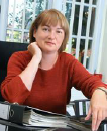Alternatively from 06.07.2021 7:00 to 06.07.2021 7:00 (your local time)
 Click here to start the meeting.
Click here to start the meeting.
Abstract
New state and market arrangements were twice imposed on the residents of the eastern part of Germany, once when Germany was divided in 1949 and again when it was reunified in 1990; these changes produced a unique natural experiment concerning the effect of policies and institutions on the gendered nature of work.
This teaching unit synthesizes research on gender equality in paid and unpaid work in East versus West Germany over the decades immediately preceding and the following reunification. We consider empirical evidence on gender equality in five major dimensions of work: the prevalence of labor market attachment, time spent in paid work, wages, employment sector and occupation, and time spent in unpaid work in the home. Taken together, developments across these dimensions suggest that, following reunification, the two parts of the country converged toward the gendered arrangement in which men are employed full-time and their female partners hold part-time jobs – with some evidence of continuing differences between East and West.
In the second half of the teaching unit, participants work in small groups together discussing selected topics of the gendered dimensions of work and how they might develop in the future.
Required Literature
Link to download the material:
https://unibox.uni-rostock.de/getlink/fiA4PnKNr89rNUE1dyaWWPJC/Haney_2002HT.pdf
Lecture presentation:
https://unibox.uni-rostock.de/getlink/fiCzrBVHqZ7ggbJoLH4i3Amv/2021-07-06_Trappe_Gender.pdf
About the lecturer

Prof. Heike Trappe is the chair-holder of the department of Sociology with the main focus on family demographics at the University of Rostock. She has been working as a professor since 2007 and worked at different universities in Germany and the United States such as the Havard University in Cambridge, USA during a research year in 2003. Professor Trappe studied Sociology at the Public University in Berlin and received her habilitation there in 2006. She is currently working and researching on social inequality and gender, research on the labor market, family and life course, gender-specific division of labor in partnership and family as well as assisted reproduction.